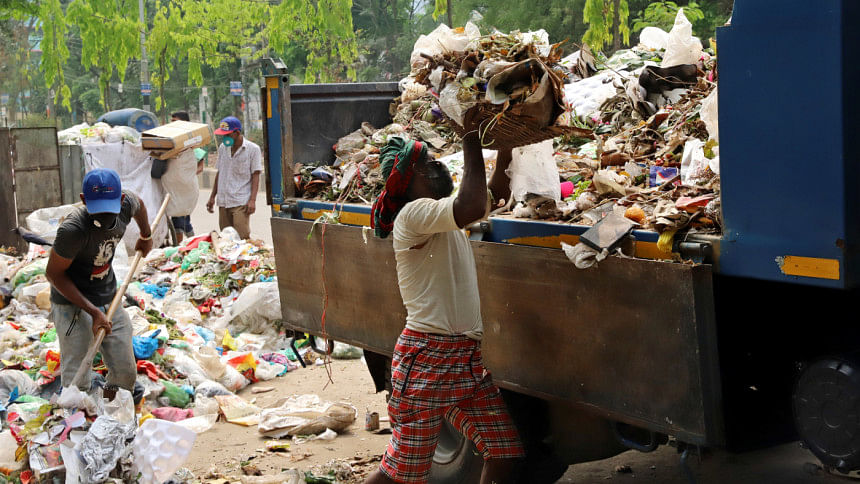Cleaners left in the lurch

As Dhaka joins the rest of the world in the fight to contain the spread of novel coronavirus, some of its frontline respondents appear to have been left in the lurch.
While the city is in fast asleep, several thousand conservancy workers of the two city corporations take to the streets to clean up the waste produced in the day, with barely any protection from the virus that may arrive with someone's household waste.
Moreover, they must carry that threat to their congested colonies, where several thousand families are crammed into tiny living spaces.
However, city corporation authorities are apparently indifferent to the safety of the cleaners, one of key groups in the battle towards decontamination.
"A single case of [Covid-19] infection can spread like a wildfire in these colonies," said Nirmol Chandro Das, secretary general of Bangladesh Horijon Oikya Parishad -- an organisation working for the interests of cleaners.
Dhaka South City Corporation (DSCC) has 5,250 cleaners, while Dhaka North City Corporation (DNCC) has 4,000.
"Death is inevitable if these colonies are infected. We've not seen any awareness campaign from authorities, let alone effective measures taken by them," he further said, adding, "We've repeatedly requested city corporations to provide gloves, masks and boots to cleaners, to prevent infection not only from coronavirus but also from other respiratory diseases; but no action has been taken."
The rate of death from respiratory diseases is high among cleaners, Nirmol claimed.
Two elderly persons from Mirpur's Tolarbag area died of Covid-19 infection on March 21 and March 22.
Khurshida, a cleaner of Tolarbag area that went under community lockdown following the deaths, told this newspaper on March 23 they are not given any mask or gloves from Dhaka North City Corporation.
"Sometimes I use a scarf, and sometimes my sari to cover my mouth," she said.
Rabeya, a cleaner from Dhanmondi area, comes out of her home at about 3am to sweep roads. "I've heard of corona. Our sirs [higher authority] told us how to clean our hands, but we were not given anything," said Rabeya, adding that she uses a scarf to cover her face while working. Rabeya's family lives with several hundred others at Ganaktuli Sweeper Colony, where they have shared bathrooms, toilets and kitchens. Many also sleep on the corridor adjacent to the staircase of the buildings. "If one of us gets infected, there will be a disaster," said a sweeper leader of the colony, preferring not to be named.
Prof Mahmudur Rahman, a former director of IEDCR, said it is essential for cleaners to use masks and gloves. "Not only to protect them from Covid-19 infection, but also to reduce their exposure to other health hazards."
DSCC Chief Waste Management Officer Air Commodore Md Zahid Hossain told this newspaper that they had taken measures to provide masks, gloves and boots for cleaners.
"We'll get 5,000 masks tomorrow [Tuesday]," he said on March 23.
DNCC Additional Chief Waste Management Officer SM Shafiqur Rahman said they could arrange gloves and masks for about 60 percent cleaners.
"We have directed them to wash their hands when they return to the station after work every day," he said, adding that they are procuring sets of gloves, masks and boots for 2,700 cleaners.
Asked what measures they have taken for cleaners' colonies, DSCC CEO Shah Md Imdadul Haque said they are busy with ensuring quarantine of returnees to prevent Covid-19 and did not have resources to focus on that.
DNCC Panel Mayor Jamal Mostafa said it is not possible to relocate cleaners, but they are taking measures to raise awareness among them.

 For all latest news, follow The Daily Star's Google News channel.
For all latest news, follow The Daily Star's Google News channel. 



Comments